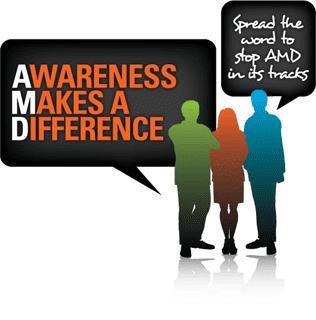Eating for the Eyes Should Always be a Part of the Menu
Maintaining A Healthy Diet Can Help Protect Vision from Age-related Macular Degeneration
CHICAGO(Jan. 24, 2012)–We’ve all heard the expression “eating with your eyes,” but many people may not be aware of the benefits of eating for your eyes. In addition to promoting overall health, a diet rich with sight-saving beta carotene, lutein, zeaxanthin, zinc, omega-3 fatty acids and certain vitamins can also help guard against vision loss from eye disease, such as age-related macular degeneration (AMD).
AMD diminishes central vision and currently affects the vision of more than 2 million Americans, ages 50 and older and is a leading cause of blindness. AMD is a progressive disease that if left untreated, can result in severe vision loss and even blindness. The exact cause of AMD is unknown, but risk factors for the disease include age, race, smoking, family history as well as those with cardiovascular disease and hypertension.
A wide variety of foods including lentils, grapes, carrots, bell peppers, broccoli, spinach, sweet potatoes, kale, certain kinds of fish, turkey and some kinds of nuts, have been shown to aid eye health. Although there are a variety of available over-the-counter supplements designed for vision and eye health, a doctor should always be consulted before use.
Foods that contain refined starches and are high in sugar can be damaging to vision. A study by Tufts University showed that high-glycemic foods cause a dramatic rise in blood sugar, which over time, may damage the retina and capillaries in the eye by promoting oxidative stress and inflammation. Soda and sugary drinks, candy, baked goods, some cereals, white rice, foods made with white flour, such as white bread and pasta, should be avoided.
According to the University of Illinois Eye and Ear Infirmary, more than one serving per week of beef, pork, or lamb as a main dish is associated with a 35 percent increased risk of macular degeneration as compared with less than three servings per month. Additionally, one serving per day of high-fat dairy food, such as whole milk, ice cream, hard cheese, or butter, also increases the risk of macular degeneration progression.
“We all know that watching what we eat can lead to overall health benefits such as lower cholesterol and a reduction of calories, but maintaining a healthy diet, day after day, can be very challenging,” said Hugh R. Parry, president and CEO of Prevent Blindness America. “Prevent Blindness America hopes to encourage the public to remember that everything we put in our mouths can affect our eyes!”
Other healthy habits can lead to healthy vision. The risk of eye disease and vision loss can be lowered by:
- Avoiding trans fats
- Quitting smoking
- Controlling blood pressure and cholesterol
- Exercising regularly
- Visiting an eye care professional on a regular basis
In conjunction with February as Age-related Macular Degeneration Awareness Month, Prevent Blindness America offers a dedicated online resource for
patients and caretakers to learn more about the disease. The website, preventblindness.org/amd, offers a variety of tools and information on everything from risk factors, treatment options, and even a downloadable Amsler Grid, (a tool that can help identify vision abnormalities linked to AMD).
For more information on AMD and other eye disease, please contact Prevent Blindness America at (800) 331-2020 or visit preventblindness.org/AMD.
Download the AMD and nutrition press release.
